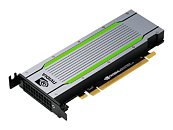- Joined
- Oct 9, 2007
- Messages
- 47,857 (7.38/day)
- Location
- Dublin, Ireland
| System Name | RBMK-1000 |
|---|---|
| Processor | AMD Ryzen 7 5700G |
| Motherboard | Gigabyte B550 AORUS Elite V2 |
| Cooling | DeepCool Gammax L240 V2 |
| Memory | 2x 16GB DDR4-3200 |
| Video Card(s) | Galax RTX 4070 Ti EX |
| Storage | Samsung 990 1TB |
| Display(s) | BenQ 1440p 60 Hz 27-inch |
| Case | Corsair Carbide 100R |
| Audio Device(s) | ASUS SupremeFX S1220A |
| Power Supply | Cooler Master MWE Gold 650W |
| Mouse | ASUS ROG Strix Impact |
| Keyboard | Gamdias Hermes E2 |
| Software | Windows 11 Pro |
NVIDIA has reportedly codenamed a future GPU architecture "Hopper," in honor of Grace Hopper, an eminent computer scientist who invented one of the first linkers, and programmed the Harvard Mark I computer that aided the American war efforts in World War II. This came to light as Twitter user "@kopite7kimi," who's had a fairly high hit-rate with NVIDIA info tweeted not just the codename, but also a key NVIDIA product design change. The tweets were later deleted, but not before 3DCenter.org reported on them. To begin with, "Hopper" is reportedly succeeding the upcoming "Ampere" architecture slated for the first half of 2020.
"Hopper" is also rumored to introduce MCM (multi-chip module) GPU packages, which are packages with multiple GPU dies. Currently, GPU MCMs are packages that have one GPU die surrounded by memory dies or stacks. This combination of GPU dies could make up "giant cores," at least in the higher end of the performance spectrum. NVIDIA reserves MCMs for only its most expensive Tesla family of compute accelerators, or Quadro professional graphics cards, and seldom offers client-segment GeForce products.

View at TechPowerUp Main Site
"Hopper" is also rumored to introduce MCM (multi-chip module) GPU packages, which are packages with multiple GPU dies. Currently, GPU MCMs are packages that have one GPU die surrounded by memory dies or stacks. This combination of GPU dies could make up "giant cores," at least in the higher end of the performance spectrum. NVIDIA reserves MCMs for only its most expensive Tesla family of compute accelerators, or Quadro professional graphics cards, and seldom offers client-segment GeForce products.

View at TechPowerUp Main Site








